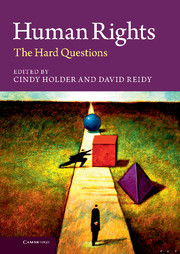Book contents
- Frontmatter
- Contents
- Figure
- List of table
- Notes on contributors
- Introduction
- Part I What are human rights?
- Part II How do human rights relate to group rights and culture?
- Part III What do human rights require of the global economy?
- Part IV How do human rights relate to environmental policy?
- Part V Is there a human right to democracy?
- Part VI What are the limits of rights enforcement?
- Part VII Are human rights progressive?
- 21 Moral progress and human rights
- 22 Human rights and moral agency
- 23 Gender mainstreaming human rights
- Afterword Rights, practice, reality and hope
- Index
- References
23 - Gender mainstreaming human rights
A progressive path for gender equality?
Published online by Cambridge University Press: 05 May 2013
- Frontmatter
- Contents
- Figure
- List of table
- Notes on contributors
- Introduction
- Part I What are human rights?
- Part II How do human rights relate to group rights and culture?
- Part III What do human rights require of the global economy?
- Part IV How do human rights relate to environmental policy?
- Part V Is there a human right to democracy?
- Part VI What are the limits of rights enforcement?
- Part VII Are human rights progressive?
- 21 Moral progress and human rights
- 22 Human rights and moral agency
- 23 Gender mainstreaming human rights
- Afterword Rights, practice, reality and hope
- Index
- References
Summary
Introduction
At the time of its official adoption in the UN system in 1997, gender mainstreaming was hailed as “progressive” by many transnational feminists because it was seen as a way to move beyond the biological sex binary of male/female, which had resulted in “just add women and stir” approaches to human rights, development and security. In tandem with the discursive shift from “sex” to “gender” in the 1993 UN Vienna Declaration on Human Rights and 1995 Beijing Platform for Action, gender mainstreaming approaches seek to take into account the ideological power and circulation of gender. As applied to human rights, gender mainstreaming approaches are, in theory, attentive to how gender shapes and impacts our experiences and achievement of rights.
Gender mainstreaming is defined as:
the process of assessing the implications for women and men of any planned action, including legislation, policies or programmes, in all areas and at all levels. It is a strategy for making women’s as well as men’s concerns and experiences an integral dimension of the design, implementation, monitoring and evaluation of policies and programmes in all political, economic and societal spheres so that women and men benefit equally and inequality is not perpetuated. The ultimate goal is to achieve gender equality.
(OSAGI 2002)- Type
- Chapter
- Information
- Human RightsThe Hard Questions, pp. 436 - 457Publisher: Cambridge University PressPrint publication year: 2013
References
- 4
- Cited by



